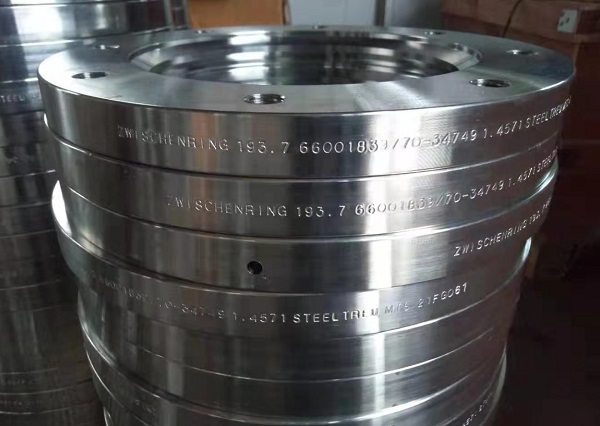Categories
- Pipe & Tube (18)
- Flange & Fitting (97)
- Fastener & Gasket (12)
- Valve & Pump (18)
- Base Material (11)
- Equipment (8)
- Application (30)
- Technical (110)
EN 10222-5 1.4571 flanges generally refer to EN 1092-1 flanges made from Type 316Ti stainless steel forgings, which is a stabilized version of austenitic stainless steel 316. This steel grade corresponds to the steel name X6CrNiMoTi17-12-2. It is equivalent to ASTM A182 F316Ti. Type 316Ti is not a listed material in ASME B16.5 nor ASME B16.47 but it is listed in group 15Eo of EN 1092-1. Moreover, EN 1092-1 flanges may be made from EN 10222-5 1.4571 forgings, EN 10028-7 1.4571 plates, or EN 10272 1.4571 bars. In this article, we only focus on the EN 10222-5 1.4571 forged flanges.
When the conventional molybdenum-bearing Type 316 austenitic stainless steel is heated for a period of time in the range of about 425 to 815°C [900 to 1500°F], chromium carbides will precipitate in grain boundaries and the area immediately adjacent is depleted of chromium. This phenomenon is known as sensitization of the stainless steel. The sensitization renders Type 316 susceptible to intergranular corrosion, which is the dissolution of the low-chromium layer or envelope surrounding each grain. Sensitization also lowers resistance to other forms of corrosion, such as pitting, crevice corrosion, and stress-corrosion cracking (SCC).

The EN 10222-5 1.4571 s/o plate flanges made to EN 1092-1 Type 01; supplied to Rotterdam, Netherlands.
Several approaches have been taken to minimize or prevent the sensitization of stainless steel 316. If the sensitization is small enough, solution annealing is the only way to correct a sensitized stainless steel. According to the time-temperature-sensitization curves, the modified version of Type 316L with low carbon content can avoid sensitization during relatively brief exposure to sensitizing temperatures, but it will be sensitized by long exposures. Since titanium has higher affinity for carbon and forms carbides readily, Type 316Ti (1.4571) with titanium addition allows the chromium to remain in solution even for extremely long exposures to temperatures in the sensitizing range. In short, the stainless steel is stabilized by titanium against sensitization. The 1.4571 (Type 316Ti) flanges shall be resistant to intergranular corrosion in both delivery condition and sensitized condition when tested in accordance with EN ISO 3651-2.
| Element | % by Mass |
|---|---|
| C | ≤0.08 |
| Si | ≤1.00 |
| Mn | ≤2.00 |
| P | ≤0.045 |
| S | ≤0.015 |
| Cr | 16.5-18.5 |
| Mo | 2.00-2.50 |
| Ni | 10.5-13.5 |
| Ti | 5 x C to 0.70 |
| Item | Requirement |
|---|---|
| Rp0.2 min. MPa | 210 |
| Rp1.0 min. MPa | 245 |
| Rm MPa | 510-710 |
| A, %, l min. | 45 |
| A, %, tr min. | 35 |
| KV2 @ 20°C l, min. J | 100 |
| KV2 @ 20°C tr, min. J | 60 |
EN 10222-5 1.4571 flanges shall be made by a forging process. The raw material/ billet is usually melted by an electric-arc furnace with refining processes, or by a vacuum furnace followed by electrosla-consumable remelting. The heat treatment of solution annealing shall be carried out after forging, in which the steel shall be heated and fully austenitized in the temperature range of 1020 to 1120°C. A water quench shall be performed immediately after the flange leaves the furnace till it cools down to 260°C or below.
The p/T ratings for EN 10222-5 1.4571 flanges indicating the maximum allowable pressure (PS, in bar unit) at maximum allowable temperature (TS, in °C unit) for various PN designations are listed in tables below.
| TS, °C | PS, bar PN2.5 | PS, bar PN 6 | PS, bar PN 10 |
|---|---|---|---|
| RT | 2.5 | 6.0 | 10.0 |
| 100 | 2.5 | 6.0 | 10.0 |
| 150 | 2.4 | 5.8 | 9.8 |
| 200 | 2.3 | 5.6 | 9.3 |
| 250 | 2.2 | 5.3 | 8.8 |
| 300 | 2.0 | 5.0 | 8.3 |
| 350 | 2.0 | 4.8 | 8.0 |
| 400 | 1.9 | 4.6 | 7.8 |
| 450 | 1.9 | 4.6 | 7.6 |
| 500 | 1.8 | 4.5 | 7.5 |
| 550 | 1.8 | 4.4 | 7.4 |
| 560 | 1.8 | 4.4 | 7.4 |
| 570 | 1.8 | 4.4 | 7.3 |
| 580 | 1.6 | 4.0 | 6.7 |
| 590 | 1.5 | 3.6 | 6.0 |
| 600 | 1.3 | 3.3 | 5.5 |
| TS, °C | PS, bar PN 16 | PS, bar PN 25 | PS, bar PN 40 |
|---|---|---|---|
| RT | 16.0 | 25.0 | 40.0 |
| 100 | 16.0 | 25.0 | 40.0 |
| 150 | 15.6 | 24.5 | 39.2 |
| 200 | 14.9 | 23.0 | 37.3 |
| 250 | 14.1 | 22.1 | 35.4 |
| 300 | 13.3 | 20.8 | 33.3 |
| 350 | 12.8 | 20.1 | 32.1 |
| 400 | 12.4 | 19.5 | 31.2 |
| 450 | 12.2 | 19.1 | 30.6 |
| 500 | 12.0 | 18.8 | 30.0 |
| 550 | 11.9 | 18.6 | 29.9 |
| 560 | 11.8 | 18.5 | 29.6 |
| 570 | 11.7 | 18.3 | 29.3 |
| 580 | 10.7 | 16.7 | 26.8 |
| 590 | 9.7 | 15.2 | 24.3 |
| 600 | 8.8 | 13.8 | 22.0 |
| TS, °C | PS, bar PN 63 | PS, bar PN 100 | PS, bar PN 160 |
|---|---|---|---|
| RT | 63.0 | 100.0 | 160.0 |
| 100 | 63.0 | 100.0 | 160.0 |
| 150 | 61.8 | 98.0 | 156.9 |
| 200 | 58.8 | 93.3 | 149.3 |
| 250 | 55.8 | 88.5 | 141.7 |
| 300 | 52.5 | 83.3 | 133.3 |
| 350 | 50.7 | 80.4 | 128.7 |
| 400 | 49.2 | 78.0 | 124.9 |
| 450 | 48.3 | 76.6 | 122.6 |
| 500 | 47.4 | 75.2 | 120.3 |
| 550 | 47.1 | 74.7 | 119.6 |
| 560 | 46.6 | 74.0 | 118.5 |
| 570 | 46.2 | 73.3 | 117.3 |
| 580 | 42.3 | 67.1 | 107.4 |
| 590 | 38.4 | 60.9 | 97.5 |
| 600 | 34.8 | 55.2 | 88.3 |
| TS, °C | PS, bar PN 250 | PS, bar PN 320 | PS, bar PN 400 |
|---|---|---|---|
| RT | 250.0 | 320.0 | 400.0 |
| 100 | 250.0 | 320.0 | 400.0 |
| 150 | 245.2 | 313.9 | 392.3 |
| 200 | 233.3 | 298.6 | 373.3 |
| 250 | 221.4 | 283.4 | 354.2 |
| 300 | 208.3 | 266.6 | 333.3 |
| 350 | 201.1 | 257.7 | 321.9 |
| 400 | 195.2 | 249.9 | 312.3 |
| 450 | 191.6 | 245.3 | 306.6 |
| 500 | 188.0 | 240.7 | 300.9 |
| 550 | 186.9 | 239.2 | 299.0 |
| 560 | 185.1 | 237.0 | 296.2 |
| 570 | 183.3 | 234.6 | 293.3 |
| 580 | 167.8 | 214.8 | 268.5 |
| 590 | 152.3 | 195.0 | 243.8 |
| 600 | 138.0 | 176.7 | 220.9 |
| Temp. °C | Rp0.2 MPa | Rp1.0 MPa | Rm MPa |
|---|---|---|---|
| 100 | 185 | 218 | 440 |
| 150 | 177 | 206 | 410 |
| 200 | 167 | 196 | 390 |
| 250 | 157 | 186 | 385 |
| 300 | 145 | 175 | 375 |
| 350 | 140 | 169 | 375 |
| 400 | 135 | 164 | 375 |
| 500 | 129 | 158 | 360 |
| Temp. °C | Creep Rupture Strength, MPa | ||
| 104 h | 105 h | 2x105 h | |
| 540 | 247 | 194 | 178 |
| 550 | 233 | 181 | 164 |
| 560 | 220 | 167 | 151 |
| 570 | 206 | 154 | 138 |
| 580 | 193 | 141 | 125 |
| 590 | 180 | 128 | 113 |
| 600 | 167 | 116 | 102 |
| 610 | 155 | 105 | 91 |
| 620 | 142 | 94 | 81 |
| 630 | 130 | 84 | 72 |
| 640 | 119 | 75 | 65 |
| 650 | 108 | 67 | 58 |
| 660 | 97 | 60 | 52 |
| 670 | 87 | 54 | 47 |
| 680 | 78 | 49 | 43 |
| 690 | 70 | 44 | - |
| 700 | 63 | - | - |
